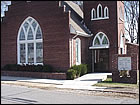 |
|
The History of Cowan Presbyterian Church: 1907-1962By L. Jarod Pearson Cowan Presbyterian Church was formed in 1907 following an episode in church history known as the “Union Movement”.
The Cumberland Presbyterian denomination was founded in 1810 (following an American religious revival known as the Second Great Awakening) and played a vital role in the pioneer settlement of Franklin County. The brush arbor at Goshen Camp Ground provided the first organized religious services in Franklin County as well as the county's first school house. Goshen Cumberland Presbyterian Church, built on the former campground, is Franklin County’s oldest church, and the members of Goshen founded and built the Cowan Cumberland Presbyterian Church in the 1886. The Union Movement began in the late 19th Century when leaders of the Cumberland Presbyterian Church developed a plan to reunite the Cumberland denomination with the larger Presbyterian Church in the U.S. In 1907, a majority of delegates to the Cumberland Presbyterian General Assembly voted in favor of reunification; however, a sizable minority voted to continue as a seperate Cumberland Presbyterian body.
The majority membership at Cowan Cumberland Presbyterian Church sided with the union movement and wanted the church to go with the reunification, but the minority ultimately retained ownership of the property. (Tennessee was one of few states where the opponents of union movement retained church property.) The members who went with the Union Movement held seperate services at the Cumberland Presbyterian Church for a brief period and then began holding services at Cowan Baptist Church. The congregation spent the next few years planning and raising funds to build a new church facility. Cowan Presbyterian Church moved into a beautiful brick structure on West Cowan Street with enormous stained glass windows and a prominent offset bell tower. The congregation grew steadily along with the population of Cowan until the latter half of the Twentieth Century. The rise of the automobile led to a decline in rail travel and encouraged the American population to shift from small town to big city suburbs. By the early 1960's it was clear to the leadership at Cowan Presbyterian that the church was no longer sustainable. Cowan Methodist Church, having organized less than two decades earlier, was in a similar struggle. Conversations between the two churches resulted in a feasability study to see if Cowan Presbyterian and Cowan Methodist could unify. People from both congregations were open to the idea as several kinships and relationships were shared among the various members. Both churches applied to their regional governing bodies for permission to form a federated church in Cowan. After careful consideration, the Bishop and District Superintendent of the Methodist Conference as well as to the Executive of Nashville Presbytery both concurred that the plan was workable. It was agreed by all parties that the congregations could each retain their own affiliation and identity while sharing resources and pastoral leadership. On June 17, 1962, members of both congregations voted overwhelmingly to complete the suggested union, and the name Cowan Fellowship Church was adopted as the name of the federated congregation.
The newly formed Cowan Fellowship Church held Sunday services in the Presbyterian building on East Cowan Street while using the Methodist building on North Poplar as a fellowship hall and youth building. In 1966, the Presbyterian building was sold to a newly formed (and short lived) congregation of the Church of God and Cowan Fellowship relocated entirely to the Methodist building. Cowan Fellowship moved into a modern new facility on East Cumberland Street in 1969 on a lot donated by Mr. Glenn Hines.
Though less visible today, Cowan Presbyterian Church still exists. The congregation is part of the larger church family at Cowan Fellowship where the small group of members elects elders to serve on a session that also serves on the general governing board for the federated church.
Click here to read about Cowan Fellowship Church, the successor to Cowan Presbyterian Church.
Information for this article was gathered from the writings of Jim and Jenny Lou Brock, Emeline Gist, and Mrs. Violet Wakeland. Compiled by L. Jarod Pearson.
|

